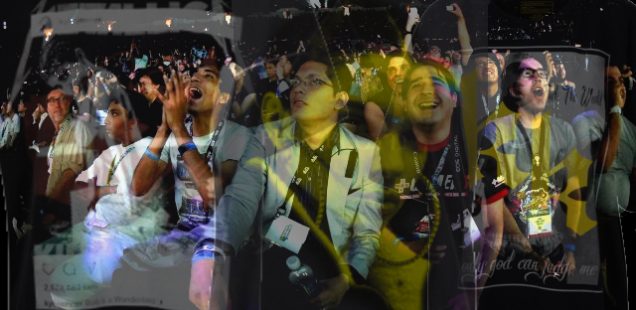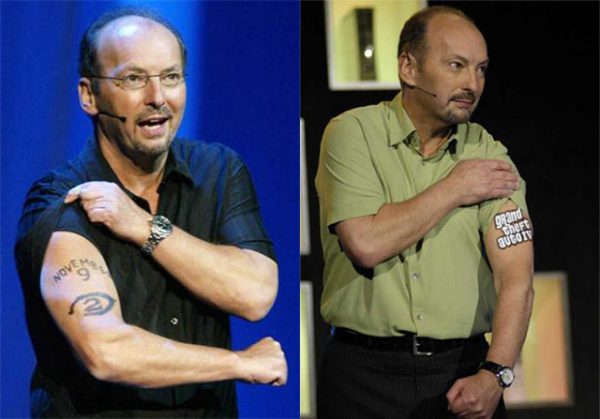
Due Diligence: Shut Up and Take My Money
Leigh Harrison isn’t feeling the hype.
The world has gone to Hell, and the handcart’s nowhere in sight. Kendall and Kylie Jenner have publicly spoojed themselves all over the faces of Ozzy Osbourne, Jim Morrison, and Tupac Shakur. Amazon has finally owned up to Prime Day being the trash heap fire sale it’s always been. And E3 has begun admitting members of the public, letting the unwashed masses embarrassingly applaud videogame trailers, just like industry professionals have been doing for years.
I find the Electronic Entertainment Expo, to give it its full name, to be a tiresome entity. That the three-day marketing extravaganza is the biggest event in the videogame calendar speaks volumes about how we consumers interact with the publishers and developers who supply us our chum. It’s a relentlessly corporate affair, where companies roll out executives and celebrities to hype up the public for upcoming games. It’s just so disingenuous and sycophantic that my cynical old bones cannot abide it. At the same time, some people love it—like, really love it.
There’s no accounting for taste in these post-downfall days. As once-sacred societal covenants break down, and late capitalism pits us against one another in ever-crueler tournament brackets, what is appropriate to say and do to our fellow humans now knows no bounds. Opinions are sacred, even if they are based entirely on false assumptions and legitimized by a careless press, which leads us to the state of wanton ignorance we now find ourselves wallowing in.
Last month, for instance, a man called Darren took the fierce and proud British tradition of racist thuggery up a gear, when he deliberately drove into a crowd of Muslims leaving prayer. In the aftermath of the terror attack, many across my fine island nation took to Facebook to express their grief at the atrocity, and Nicola Evans, of Abingdon-On-Thames, Oxfordshire, was no different.
“Well after all said and done I feel truly saddened and upset by today’s events in Finsbury Park, saddened that Darren Osborne, a father of 4 was at his wits end about what’s happening in our country … with the Muslim problem to do what he thought was the right thing to protect his people and take drastic action! I am also upset that this poor man will probably never see the light of day again, my thoughts are with him, his children, family and friends, heartbreaking!”
Heartbreaking indeed.
Elsewhere, we see the perma-tanned chipmunk of patriotism declaring “Brexit means Brexit! No one need know about the future of the country,” in the face of legislative upheaval that will see her annual bronzing sessions in Magaluf become bottles of vitamin D supplements and one of those wide-brimmed hats albinos have to wear. Que sera, sera, fair Britannia. At least we’ll soon be out of the pesky single market. Boo! Free trade is overrated!

But what of videogames and E3? And are they really comparable in any way to the objectionable resurgence of flagrant racism and the small-minded, small-c conservatism of Middle England? Well, people who enthusiastically partake in any of them are idiots, innit, so yes, yes they are.
For context, back in my days of solitary debauchery, before I blossomed into a married, home owning member of the North London Metropolitan Liberal Elite, I drunkenly opined that people who spend lots of money on games, specifically new hardware, “are both pioneers and, quite often, mindless idiots.” (It’s not actually about E3, granted, but I can’t go back in time and change things so this flows better, so just stick with me here.) I did so primarily for human interaction; an inebriat looking to antagonistically stoke spirited conversation in the lonely twilight hours. But I also rubbished my peers because I believed in what I was saying. And here I am, three and a half years later, ready to say it all again with diminished conviction and even less nuance. How my craft has improved!
This time, my ulterior motive is to file a column about videogames without having to talk about them in any specificity. I’ve of late hit an all-time nadir in my appreciation of the medium and can find no redeemable qualities in anything I play. Six weeks ago, I found myself at rock bottom and contemplated ending it all; turning this monthly splurge of once piercing insight into a year-long exploration of The Elder Scrolls Online. But the overt blandness of its every interaction, combined with the game’s pernicious disregard for its players’ time and money, coaxed me in from the ledge before it was too late. Not all games can be as unrelentingly bad as TESO, so there’s probably hope for the future yet, right?
And so where better to look to the future than E3, the grandest, most brightest, most bestest look at tomorrow that humanity could possibly ever imagine. If the world indeed doth revolve around the Sun, then that celestial body must surely be made of molten Blu-rays and Xbox Live Gold cards. If it weren’t, there’d be nothing to stop the massive revolving disc we call home floating off into the majesty of God’s 6000-year-old cosmos.
But I’m not going to sit here and mock the Electronic Entertainment Expo for cheap pops. It satirizes itself by merely existing in 2017, a gnarled sellout in the vein of Henry Rollins, just without the prior years of deserved respect to pull off the caper. And besides, the publisher Devolver Digital already did it for me.

The “Devolver Digital Big Fancy Press Conference 2017” was covered by a number of major games press outlets, which is how I found out about it. Like the digital-only software purveyor itself, the fake press conference gleefully subverted ageing industry practices to bolster both public goodwill and, in all likelihood, the bottom line. It lampooned the artificial grandiosity of videogame trailers-as-spectacle, executives pretending to be charismatic and/or human, and the general concept of a string of press conferences as a form of entertainment. The DDBFPC did exactly what one would want from a satirical take on a relentlessly arrogant industry, and did it while brazenly advertising its own wares. That the insurgency came from within just makes the blows sting that little bit more.
But for all the “this is the most bizarre thing I’ve ever seen,” and “OMG, ain’t it cray cray someone actually said it?!!!??!” punditry from the culturally neutered mainstream I can’t see ever hiring me, everyone missed the point. The DDBFPC was not simply an attack on the self-debasement of the videogame industry at large, but a thumbing of the nose to the very consumers who allow it to happen in the first place.
The DDBFPC doesn’t pull its punches when trying to make us see sense. Like all good satire, it shows us the ugly absurdity of our behavior in an effort to change us for the better. The best skit involves Devolver Digital ScreenPay, a monitor that subsumes physical cash dollar as a form of payment for nothing in particular. It’s the oft-stated mantra of “shut up and take my money” made flesh; the capitalist’s wet dream of a consumer willing to deposit funds straight into their coffers, no questions asked. It’s shot at hype culture, yes, but one aimed squarely at the gamer and not the industry. The DDBFPC asks us how far we’re willing to let our enthusiasm for games go; where we’d finally draw the line and say to publishers that “enough is enough, we won’t spend another dime.”
The segment reminds us that we wouldn’t blindly throw money at a screen, and asks why we’re happy to accept pre-orders, DLC, HD remasters, and all that other shit publishers have invented to eke out more and more cash from us. To hammer home this point, the segment ends with an explicit warning. An audience member is enthusiastically launching money into ScreenPay, when he strays too close and his arm is sucked into the contraption, entirely severing his hand from the wrist down. As he writhes around to cheers and applause, spraying blood all over the conference stage, Devolver Digital seems to wink at us and ask if we feel at all foolish yet. I’d like to think we all do.
The rest of the 15 minute conference adheres to a similar rhythm. There’s the Comment Created Content feedback system, which analyzes internet rants and then patches games ad hoc in the moment, so the precious player is always happy. Earliest Access is a service that “hastily rush[es] unfinished game content out to consumers” by releasing and charging for games at their exact point of conception, before anything is even made. The presenters are explicit in their aims for the event: “Give. Us. Your. Hard. Earned. Money!” Even the dramatic editing, which cuts to new angles every word or so to spice up the jargon, pokes fun at the typical E3 audience, highlighting how simple techniques are used make mundane sales patter appear noteworthy and impactful.
A satirical press conference, then, that pokes fun at the industry, so you can feel secure about watching press conferences for a week—you’re in on the joke, after all, right? It wouldn’t be worth writing about—unless you work for Polygon, Kotaku, Gamespot, or VG247—if it simply stated the obvious, half-hearted anti-industry sloganeering we hear all the time. But the DDBFPC goes further and actually mocks the hitherto unmockable core demographic gamer; the true source of both the industry’s wayward aspirations and the very perpetuation of its practices. And that’s a really good thing. Somebody needed to tell us all off.

Even Jim Fucking Sterling Son, the proud defender of consumer rights I can admire on occasion, failed to mention the obvious disdain the DDBFPC showed to gamers when he crowned it his winner of E3 2017. As much as I respect my fellow countryman’s achievements, it must be said that while he often rails against industry malpractice, he’s much less likely to openly and vociferously call out the disgrace that is the game playing public at large, probably because we pay his bills. We are, if we’re being honest, even more culpable for the sorry state of society than racists and bigots, because we willingly embrace and frequently celebrate the greed of videogame big business. And that’s much worse—because our actions affect us, not someone else we don’t care to know.
This economic devotion to games, to take a little detour via my soapbox, manifests itself in really ugly forms. There is, of course, the deplorable misogyny that runs through (y)our culture, bubbling just under the surface at all times. While I’m well within my rights to order my own wife to cook and clean and work a full-time job with more responsibilities and a better salary than me, I’m not deluded enough to think I can do that to half the population of Earth. That’s because, to put it plainly, I’m just not scared of women. And that’s the real truth of all this nonsense. As is the case with Darren Osborne, Nicola Evans, and Lady Brexit, mistrust, fear, and ultimately bigotry are fueled by ignorance—by us just not knowing.
In the context of gamers, this happens at least partially because we’re too busy with all the banal nerdy shit we’re supposed to be into. From guides on how to purchase as much as possible in an evil Steam sale, to pointless dissections of a Zelda timeline that doesn’t exist—we can’t get enough of the fruits of the industry, and so other aspects of our worldview take a hit. The noun “gamer” is often worn like a badge of honor; a proud identifier that we’re so into games our interest in them has literally shaped our being. Because every purchase only strengthens our connection to the thing that defines us, we always want new and shiny releases, lavish collector’s edition statuettes, and the limited to 200 prints Portal 2 poster that hangs in my living room. In so closely allying our personal identity with a commodity, we happily allow companies to mine us for cash.
Games are worth a notable amount of money at this juncture, grossing $91bn worldwide vs. film’s $38.6bn box office sales. Developers and publishers, while essentially distributors of fun, are not our friends. Games are naught but products to be marketed and sold, no different from chairs, pomegranates, or hand-blown artisanal glassware. Until we fully appreciate this, we’ll forever be open to financial exploitation, and find ourselves happily spending $150 on a poster (never again).

I’ve railed against the unedifying behaviour of game enthusiasts before, but I’ve clearly bridges left to burn. The less I play, and the deeper I get into the exhausting ten week piss-up that constitutes the fleeting British summer, the more separated I feel from almost everyone else who likes games. I just don’t understand it anymore. Not the excitement, not the positivity, not even the basic faith in them as an artform. None of it. But in my seemingly inescapable medium dry cider-fueled summer fug, I’m not about to admit this is my problem, am I? No, it’s E3’s fault. It’s the enthusiast press. It’s players. It’s people with a genuine, heartfelt love of videogames. Because this is the internet, after all, and if we don’t agree it’s obviously because you’re wrong.
So here we are: the killing blow. E3 is a showcase of much more than upcoming games. The yelps, standing ovations, tears, and rapturous applause all signal how grossly over familiar we have become with an industry we purchase goods from. That’s the worst part of E3, not the sales patter and fake smiles. They are to be expected, really: it’s a massive press conference. So I’ll rise from my chair, woop and weep gently into the darkness, and heartily applaud Devolver Digital for its honesty—even if that honesty was delivered via a piece of ironic postmodern marketing. It was about time someone slapped some sense into us. And although nobody seemed to notice at the time, the publisher did more than anyone has ever dared to redress the relationship between producer and consumer.
Leigh Harrison lives in London, and works in communications for a medical charity. He likes canals and rivers a great deal, and spends a lot of his time walking. He occasionally says things about videogames on the Internet, and other things on The Twitter.